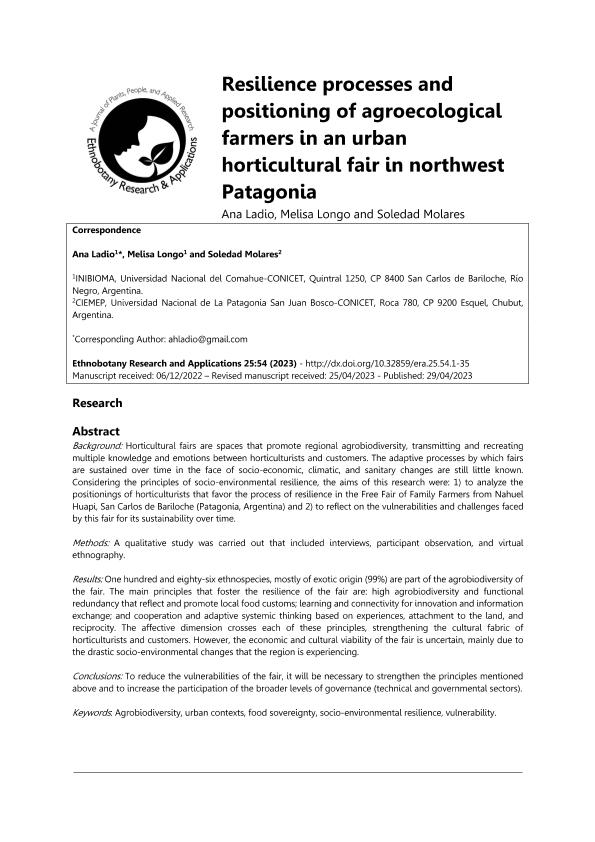Mostrar el registro sencillo del ítem
dc.contributor.author
Ladio, Ana Haydee

dc.contributor.author
Longo Blasón, Melisa Stefania

dc.contributor.author
Molares, Soledad

dc.date.available
2024-01-31T14:56:53Z
dc.date.issued
2023-01
dc.identifier.citation
Ladio, Ana Haydee; Longo Blasón, Melisa Stefania; Molares, Soledad; Resilience processes and positioning of agroecological farmers in an urban horticultural fair in northwest Patagonia; Ilia State University; Ethnobotany Research and Applications; 25; 54; 1-2023; 1-35
dc.identifier.issn
1547-3465
dc.identifier.uri
http://hdl.handle.net/11336/225390
dc.description.abstract
Background: Horticultural fairs are spaces that promote regional agrobiodiversity, transmitting and recreating multiple knowledge and emotions between horticulturists and customers. The adaptive processes by which fairs are sustained over time in the face of socio-economic, climatic, and sanitary changes are still little known. Considering the principles of socio-environmental resilience, the aims of this research were: 1) to analyze the positionings of horticulturists that favor the process of resilience in the Free Fair of Family Farmers from Nahuel Huapi, San Carlos de Bariloche (Patagonia, Argentina) and 2) to reflect on the vulnerabilities and challenges faced by this fair for its sustainability over time. Methods: A qualitative study was carried out that included interviews, participant observation, and virtual ethnography. Results: One hundred and eighty-six ethnospecies, mostly of exotic origin (99%) are part of the agrobiodiversity of the fair. The main principles that foster the resilience of the fair are: high agrobiodiversity and functional redundancy that reflect and promote local food customs; learning and connectivity for innovation and information exchange; and cooperation and adaptive systemic thinking based on experiences, attachment to the land, and reciprocity. The affective dimension crosses each of these principles, strengthening the cultural fabric of horticulturists and customers. However, the economic and cultural viability of the fair is uncertain, mainly due to the drastic socio-environmental changes that the region is experiencing. Conclusions: To reduce the vulnerabilities of the fair, it will be necessary to strengthen the principles mentioned above and to increase the participation of the broader levels of governance (technical and governmental sectors).
dc.format
application/pdf
dc.language.iso
eng
dc.publisher
Ilia State University
dc.rights
info:eu-repo/semantics/openAccess
dc.rights.uri
https://creativecommons.org/licenses/by-nc-sa/2.5/ar/
dc.subject
AGROBIODIVERSITY
dc.subject
FOOD SOVEREIGNTY
dc.subject
SOCIO-ENVIRONMENTAL RESILIENCE
dc.subject
URBAN CONTEXTS
dc.subject
VULNERABILITY
dc.subject.classification
Conservación de la Biodiversidad

dc.subject.classification
Ciencias Biológicas

dc.subject.classification
CIENCIAS NATURALES Y EXACTAS

dc.subject.classification
Ciencias Sociales Interdisciplinarias

dc.subject.classification
Otras Ciencias Sociales

dc.subject.classification
CIENCIAS SOCIALES

dc.title
Resilience processes and positioning of agroecological farmers in an urban horticultural fair in northwest Patagonia
dc.type
info:eu-repo/semantics/article
dc.type
info:ar-repo/semantics/artículo
dc.type
info:eu-repo/semantics/publishedVersion
dc.date.updated
2024-01-30T12:04:19Z
dc.journal.volume
25
dc.journal.number
54
dc.journal.pagination
1-35
dc.journal.pais
Georgia
dc.journal.ciudad
Tbilisi
dc.description.fil
Fil: Ladio, Ana Haydee. Consejo Nacional de Investigaciones Científicas y Técnicas. Centro Científico Tecnológico Conicet - Patagonia Norte. Instituto de Investigaciones en Biodiversidad y Medioambiente. Universidad Nacional del Comahue. Centro Regional Universidad Bariloche. Instituto de Investigaciones en Biodiversidad y Medioambiente; Argentina
dc.description.fil
Fil: Longo Blasón, Melisa Stefania. Consejo Nacional de Investigaciones Científicas y Técnicas. Centro Científico Tecnológico Conicet - Patagonia Norte. Instituto de Investigaciones en Biodiversidad y Medioambiente. Universidad Nacional del Comahue. Centro Regional Universidad Bariloche. Instituto de Investigaciones en Biodiversidad y Medioambiente; Argentina
dc.description.fil
Fil: Molares, Soledad. Consejo Nacional de Investigaciones Científicas y Técnicas. Centro Científico Tecnológico Conicet - Patagonia Norte. Centro de Investigación Esquel de Montaña y Estepa Patagónica. Universidad Nacional de la Patagonia "San Juan Bosco". Centro de Investigación Esquel de Montaña y Estepa Patagónica; Argentina
dc.journal.title
Ethnobotany Research and Applications
dc.relation.alternativeid
info:eu-repo/semantics/altIdentifier/url/https://ethnobotanyjournal.org/index.php/era/article/view/4347
dc.relation.alternativeid
info:eu-repo/semantics/altIdentifier/doi/http://dx.doi.org/10.32859/era.25.54.1-35
Archivos asociados
